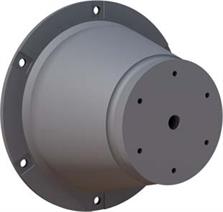Fenders Design
Principles of Fendering

Fendering is basically the interface between a vessel and the berth facility. This medium serves to absorb a certain portion of the kinetic energy of a vessel without damage to the vessel and the waterfront structure. In the case of rubber fenders, which are generally relatively soft, the majority of the energy is absorbed through elastic deflection of the fender. But, possibly also the deflection of the berth facility and/or the vessel’s hull will contribute to the absorption of the kinetic energy.
Click here for more informtion

Berthing Energy
The kinetic energy of a berthing ship needs to be absorbed by a suitable fender system and this is most commonly carried out using well recognised deterministic methods as outlined in the following sections.
Click here for more informtion

Fender Selection
After the effective berthing Energy(EB) of the ship is calculated as explained above, the selection of the fender system should be conducted in accordance with the fenders performance(Reaction Force, Energy absorption, and deflection curve).
Click here for more informtion

Fender Panel Design
Fender panels are critical to the correct performance of the fender system. It’s used to distribute the reaction forces to the hull of berthing vessels. Many factors should be considered for the design calculation, such as hull pressure and tidal range, steel grade, bending, service life and so on
Click here for more informtion

Chain Design
Click here for more informtion

Fendering is basically the interface between a vessel and the berth facility. This medium serves to absorb a certain portion of the kinetic energy of a vessel without damage to the vessel and the waterfront structure. In the case of rubber fenders, which are generally relatively soft, the majority of the energy is absorbed through elastic deflection of the fender. But, possibly also the deflection of the berth facility and/or the vessel’s hull will contribute to the absorption of the kinetic energy.
Click here for more informtion

Berthing Energy
The kinetic energy of a berthing ship needs to be absorbed by a suitable fender system and this is most commonly carried out using well recognised deterministic methods as outlined in the following sections.
Click here for more informtion

Fender Selection
After the effective berthing Energy(EB) of the ship is calculated as explained above, the selection of the fender system should be conducted in accordance with the fenders performance(Reaction Force, Energy absorption, and deflection curve).
Click here for more informtion

Fender Panel Design
Fender panels are critical to the correct performance of the fender system. It’s used to distribute the reaction forces to the hull of berthing vessels. Many factors should be considered for the design calculation, such as hull pressure and tidal range, steel grade, bending, service life and so on
Click here for more informtion

Chain Design
There are three types of chains in fender systems: 1. Tension Chain: The main function of the tension chain is to protect the fender from damage while it is under compression. 2. Weight Chain: The weight chained is used to support the weight of the frontal and face panel. 3. Shear Chain: This chain protects the fender from damage while in shear deflection.
Click here for more informtion
Product Categories
Contact Info
E-mail: info@dolphinmarines.com
Tel: 00852-29738324
Fax: 00852-21159613

 info@dolphinmarines.com
info@dolphinmarines.com

